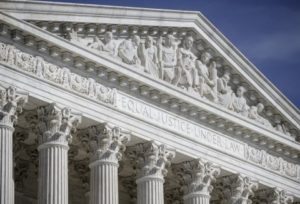by WorldTribune Staff, September 1, 2016
North Carolina’s voter ID law has been invalidated for the November elections after the Supreme Court on Aug. 31 split 4-4 on the state’s appeal for a stay of a circuit court’s ruling striking down the law.
Chief Justice John Roberts and Justices Anthony Kennedy and Samuel Alito would have granted the stay, except for the law’s preregistration provision. Justice Clarence Thomas would have granted the stay in its entirety.

Justices Ruth Bader Ginsburg, Stephen Breyer, Sonia Sotomayor, and Elena Kagan opposed the delay until the Supreme Court could consider the matter in its fall term, which opens in October. First opinions from the fall term are typically issued in December or January.
The late Justice Antonin Scalia, a conservative who died earlier this year, would have cast the deciding vote had he lived.
North Carolina House Speaker Tim Moore and Senate President Pro Tem Phil Berger, said they were disappointed with the decision.
“We respect the court, but are disappointed North Carolina will not be among the more than 30 other states with commonsense voter ID in place for the upcoming election,” Berger and Moore said in a joint statement.
The 4th U.S. Circuit Court of Appeals struck down the state’s voter ID law in July. The appeals court also overturned four other provisions of the 2013 election reform law — shortening the early voting period from 17 days to 10 days, eliminating same-day voter registration during early voting, eliminating out-of-precinct voting, and allowing teenagers to preregister before they turn 18.
The ACLU, one of the plaintiffs in the lawsuits challenging the law, praised the Supreme Court’s decision.
“The Supreme Court was correct to deny North Carolina’s last-ditch effort to undermine African-American voter participation in the November election,” said Dale Ho, director of the ACLU’s voting rights project. “This ruling means that thousands of voters who would have been disenfranchised will now be able to participate in the presidential election.”
Earlier this year, U.S. District Judge Thomas Schroeder ruled for the state, saying the 2013 law passed constitutional muster. The 4th Circuit overturned Schroeder’s order.
